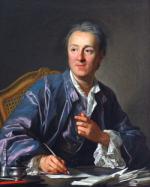Disable ads!
Denis Diderot
This article is written like a personal reflection or opinion essay that states the Wikipedia editor's particular feelings about a topic, rather than the opinions of experts. Please help improve it by rewriting it in an encyclopedic style. (November 2014) Denis Diderot Diderot, by Louis-Michel van Loo, 1767. Born (1713-10-05)5 October 1713 Langres, Champagne, France Died 31 July 1784(1784-07-31) (aged 70) Paris, France Era 18th-century philosophy Region Western philosophy School Encyclopédistes Main interests Fatalism, atheism, political philosophy, determinism Influences Baruch de Spinoza John Locke Voltaire Miguel de Cervantes Laurence Sterne Niccolò Machiavelli Samuel Richardson Isaac Newton Lucretius Rene Descartes Influenced Étienne Bonnot de Condillac Baron d'Holbach Johann Wolfgang von Goethe Milan Kundera Günter Grass Jacques Barzun Signature Denis Diderot (French: [dəni didʁo]; 5 October 1713 – 31 July 1784) was a French philosopher, art critic and writer. He was a prominent figure during the Enlightenment and is best known for serving as co-founder, chief editor and contributor to the Encyclopédie along with Jean le Rond d'Alembert. Diderot also contributed to literature, notably with Jacques le fataliste et son maître (Jacques the Fatalist and his Master), which was influenced by Laurence Sterne's novel Tristam Shandy in challenging conventions regarding novels and their structure and content, while also examining philosophical ideas about free will. Diderot is also known as the author of the dialogue Le Neveu de Rameau (Rameau's Nephew), upon which many articles and sermons about consumer desire have been based.
 Read more on wikipedia.org Read more on wikipedia.org
 All quotes by Denis Diderot All quotes by Denis Diderot
 Edit Edit
|

|
|
|
|
|
Background photo by Giuliana
|